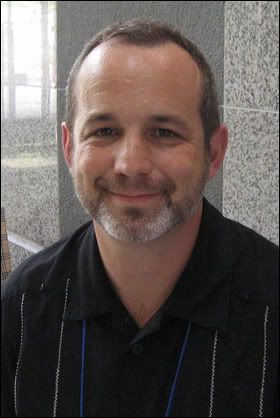U.S. High-Schoolers Get First Anglo Teacher of Korean
 This is a great story. L.A. has its first Anglo-American teaching Korean in the Los Angeles Unified School District (LAUSD). Not much else to add as the article covers the story well.
This is a great story. L.A. has its first Anglo-American teaching Korean in the Los Angeles Unified School District (LAUSD). Not much else to add as the article covers the story well.
U.S. High-Schoolers Get First Anglo Teacher of Korean
David Hanes has become the first Anglo-American to teach Korean to Korean-American students at high school. He is to start teaching at Los Angeles High School.Sphere: Related Content
Hanes passed the Korean teacher examination administered by the California state government last year. He arrived in Korea last week to attend a training Course for Korean language teachers in the U.S. co-hosted by the Foundation for Korean Language and Culture in the U.S.A, the International Korean Language Foundation and the Ewha Humanities Center at Ewha Womans University.
“I’m going to teach a class for second- to fourth-generation Koreans who can speak little Korean and hope to teach advanced Korean in the future,” Hanes told the Chosun Ilbo. “I’m a bit worried that Korean-American students will form a low opinion of me if my Korean’s not good.”
Hanes, who became interested in Korea when he lived in Los Angeles’ Koreatown, started learning the language at the Korean Cultural Center six years ago. Now he has a teacher’s certificate himself.
Ailee Moon, the president of the Foundation for Korean Language and Culture in Los Angeles, says, “The Korean teacher examination is so difficult that even Korean-Americans often fail. It’s really great that Hanes as a foreigner passed the examination.”
Hanes likes foreign languages. He majored in Russian at UC Santa Cruz and went on to get a Spanish teacher’s certificate. Ten years ago, he started learning Chinese, and now he also has a Chinese teacher’s certificate.
He is learning about contemporary Korean society by reading books and watching Korean soaps since teachers have to cover politics, economics, society and culture in Korean class at U.S. schools. “Lately I’ve been reading the Korean comic book ‘Kid Gang.’ I want to set an example for other foreign teachers as the first non-Korean teacher, and I hope many others will follow suit.”












That's a cool story! There's an Anglo teacher of Japanese where I teach--he's awesome.
ReplyDeleteIt's a very cool story. I'm glad you liked it preya.
ReplyDeleteNice story, but something a little odd I noticed..
ReplyDeleteAilee Moon, the president of the Foundation for Korean Language and Culture in Los Angeles, says, “The Korean teacher examination is so difficult that even Korean-Americans often fail. It’s really great that Hanes as a foreigner passed the examination.”
Umm...wait a second. Ailee, speaking in Los Angeles is describing Mr. Hanes as a "foreigner". Did I miss some sort of annexation of Koreatown by the ROK. Last time I checked, it was still part of the US, making Mr. Hanes very much not a foreigner.
Same thing happened to me once in Chicago when I entered a Korean restaurant and the grandmother yelled to her family that a way-Gook had entered the premises. I quickly educated her (in Korean) that in fact she was the way-gook as we were in Chicago at the time. She was more than a bit shocked.
Her error was understandable as she was speaking in Korean. But Ms. Moon had better learn to describe Americans as non-Koreans, as opposed to "foreigners".
Actually, I think there's one here in Michigan...must ask the person I think told me about him.
ReplyDeleteHey Anon ;-)
ReplyDeleteI noticed that too, but honestly I got the meaning of what she was saying. It's no different than a situation where someone says something about how many black friends they have or if someone uses some sort of misnomer.
She should learn it, but there is still such an "us" vs. "them" mentality with Koreans that, I'm sure even back home in L.A. in Koreatown non-Koreans might be referred to as waguks (foreigners for you folks not familiar with that.)
Hey Kangmi,
ReplyDeleteI wouldn't be surprised. I mean there have been foreigners in Korea for awhile and, eventually, even though Koreans are bad at selling their own culture foreigners who experience it will help spread the good parts of it. That definitely means the language too.
That is so cool!
ReplyDeleteIt is pretty cool.
ReplyDeleteThanks for the comments, BTW.